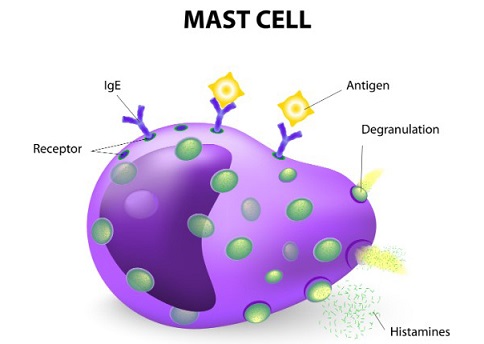Nikhil Prasad Fact checked by:Thailand Medical News Team Jun 13, 2024 1 year, 8 months, 1 week, 6 days, 18 hours, 41 minutes ago
Immunology Updates: Mast cells (MCs) are specialized cells found throughout the body, especially in mucosal and epithelial tissues. They play a dual role in both health and disease. These cells are part of our immune system and are essential in both our body's defense mechanisms and in maintaining physiological balance. However, they can also contribute to various diseases. This
Immunology Updates editorial report by Dr Giovanna Traina from the University of Perugia-Italy details the latest study findings about our understanding of mast cells.
 Understanding Mast Cells
What Do Mast Cells Do?
Understanding Mast Cells
What Do Mast Cells Do?
Mast cells regulate many vital processes. They help in:
-Vasodilation: Expanding blood vessels to improve blood flow.
Immune Responses: Participating in both innate (immediate) and adaptive (long-term) immune responses.
-Homeostasis: Maintaining the body's internal balance.
They also play a significant role in cancer by influencing the immune environment around tumors and aiding in the formation of new blood vessels (angiogenesis) and lymphatic vessels (lymphangiogenesis).
Mast Cells in Disease
On the flip side, mast cells are notorious for their role in allergic reactions, asthma, and anaphylaxis. These cells release substances like histamine, which can cause inflammation and pain. They are also implicated in gastrointestinal disorders and other inflammatory diseases.
How Mast Cells Respond
Mast cells are highly adaptable. They can respond to a wide variety of stimuli, and their responses are influenced by their environment. They possess a broad range of receptors, such as pattern recognition receptors (PRRs) and Toll-like receptors (TLRs), which help them detect pathogens and trigger immune responses.
Communication and Activation
Mast cells communicate with many other cells, both immune and non-immune. Upon activation, they release various molecules including:
-Histamine: Causes allergic symptoms.
-Leukotrienes and Prostanoids: Involved in inflammation.
-Cytokines and Chemokines: Attract other immune cells to the site of infection or injury.
These substances play crucial roles in the body's inflammatory response and can contribute to the development of various diseases.
Mast Cells in Bone and Joint Health
Mast cells are involved in bone and joint health. They produce factors like the receptor activator of nuclear factor-kappa B ligand (RANKL), which is crucial for bone remodeling and osteoclast formation. In diseases like osteoarthritis, mast cells contribute to inflammation and pain. Interestingly, mice deficient in mast cells are protected fr
om bone loss, highlighting their significant role in bone health.
Endometriosis and Mast Cells
Mast cells also play a part in endometriosis, a painful condition where tissue similar to the lining of the uterus grows outside it. These cells are recruited to endometriotic lesions, where they contribute to inflammation and pain, often under the influence of estrogen.
Mast Cells and Chronic Inflammation
Chronic inflammation is a common thread in many diseases, including:
-Autoimmune Diseases: Like multiple sclerosis and rheumatoid arthritis.
-Cardiovascular Diseases: Such as atherosclerosis.
-Neurodegenerative Diseases: Including Alzheimer's disease.
Mast cells release various inflammatory molecules that can perpetuate these chronic conditions. They are also implicated in skin conditions like eczema and atopic dermatitis.
The Role of Mast Cells in COVID-19
Recent studies have shown that COVID-19 can activate mast cells, leading to the release of pro-inflammatory molecules that contribute to the severe inflammatory response seen in some patients. This makes understanding and potentially targeting mast cells an important area of research in the fight against COVID-19.
Mast Cells in the Gut
In the gastrointestinal tract, mast cells play a pivotal role in maintaining the integrity of the epithelial barrier. This barrier is crucial for preventing harmful substances from entering the bloodstream. Dysfunction in mast cell activity can lead to increased permeability, contributing to conditions like irritable bowel syndrome (IBS) and other inflammatory bowel diseases (IBD).
Potential Therapies Targeting Mast Cells
Given their role in so many diseases, targeting mast cells offers a promising therapeutic strategy. Natural substances like resveratrol and probiotics have shown potential in stabilizing mast cells and reducing the release of inflammatory cytokines. These approaches could help manage chronic inflammation and related diseases.
Conclusion
Mast cells are a fascinating and complex component of our immune system. They are involved in numerous physiological processes and can significantly impact health and disease. Understanding their functions and finding ways to modulate their activity could open new avenues for treating a wide range of conditions, from allergies and asthma to chronic inflammatory diseases and beyond.
The latest updates about mast cells were published as an editorial in the peer reviewed International Journal of Molecular Sciences.
https://www.mdpi.com/1422-0067/25/12/6443
For the latest
Immunology Updates, keep on logging to Thailand Medical News.
Read Also:
https://www.thailandmedical.news/news/the-role-of-mast-cells-in-sars-cov-2-induced-neuroinflammation
https://www.thailandmedical.news/news/sars-cov-2-triggers-mast-cell-degranulation-and-induces-respiratory-tract-epithelial-inflammation-and-injury
https://www.thailandmedical.news/news/coronavirus-research-singapore-study-shows-that-mast-cell-activation-plays-key-role-in-severe-covid-19-and-chymase-could-be-an-important-biomarker
